The Holy Spirit is a perfect stranger, if not “a prisoner of luxury”, to many unaware Christians. Yet he is the one who “moves the Church”, who leads us to Jesus and makes us “real” as opposed to “virtual Christians”. During Mass at Santa Marta on Monday morning, 9 May, of the week preceding Pentecost, Pope Francis urged us to reflect on the central role that the Holy Spirit plays in the life of a believer.
At the start of the celebration the Pope pointed to the image of St Louise de Marillac placed near the altar. It was the first time her liturgical memorial was celebrated on this date. From her canonization in 1934 until the present, her feast day has been celebrated on 15 March. Monday also marked the anniversary of her beatification on 9 May 1920. It was an especially important date, the Pontiff explained, because Louise de Marillac was the foundress of the Daughters of Charity of St Vincent de Paul, the sisters who work and support the Casa Santa Marta. Therefore, Francis added, “I will offer this Mass for the sisters of the house”.
For his reflection in the homily, the Pope led off from the day’s reading from The Acts of the Apostles (19:1-8). In Ephesus Paul met several disciples who believed in Jesus. He asked them: “Did you receive the Holy Spirit when you believed?”. After looking around, rather surprised, they answered: “No, we have never even heard that there is a Holy Spirit”. Thus, the Pope noted, “they believed in Jesus, they were good disciples, but they hadn’t even heard that the Holy Spirit existed”.
Paul immediately resumed the dialogue, asking what baptism they had received. “John’s baptism”, the disciples replied. Paul then explained to them that “that was a baptism of repentance, of preparation”. On hearing Paul, the disciples of Ephesus “were baptized in the name of the Lord Jesus”. The passage reads: “And when Paul had laid his hands upon them, the Holy Spirit came on them; and they spoke with tongues and prophesied”. Thus, the Pope explained, “it is a journey: the journey of conversion, but they lacked baptism and the imposition of hands, for the Holy Spirit to come”.
“The same thing happens today”, the Pontiff affirmed. Most Christians know little or nothing of the Holy Spirit. They could answer the same way that the disciples of Ephesus responded to Paul: “We have never even heard that there is a Holy Spirit”. If we were to ask many good people: “who is the Holy Spirit to you?” and “where is and what does the Holy Spirit do?”, their only response would be that he is “the third person of the Trinity”.
Exactly as they learned in catechism. Of course, “they know that the Father created the world, because creation is attributed to the Father”. And they also know that “the Son is Jesus, that he redeemed us and gave his life”. Thus, “they tell you everything” in this regard. When it comes to the Holy Spirit, however, they only know that he is “the third person of the Trinity”. If you ask: “what does he do?”, people answer: “he’s there!”. Many Christians “stop there”.
Francis then explained that “the Holy Spirit is the one who moves the Church; he’s the one who works in the Church, in our hearts; he is the one who makes each Christian a person different from another, but he creates unity among everyone”. Thus, the Pope continued, the Holy Spirit “is the one who leads forward, throws open the doors and sends you to bear witness to Jesus”.
The Pope recalled that at the beginning of Mass, the entrance antiphon stated: “You will receive the Holy Spirit and you will be my witnesses, even to the ends of the earth”. Thus, “the Holy Spirit is the one who moves us to praise God, who moves us to pray: ‘Pray, in us’”. The Holy Spirit “is the one who is in us and who teaches us to look to the Father and call him: ‘Father’”. This is how “he frees us from the state of orphanhood into which the worldly spirit may lead us”. For all these reasons, the Pontiff explained, the Holy Spirit “is very important: he is the protagonist of the living Church: he is the one who works in the Church”.
At this point, the Holy Father warned of something dangerous: “When we do not live up to the mission of the Holy Spirit and do not receive him in this way”, we wind up “reducing the faith to morals, to ethics”. We think that it is enough to fulfill all the Commandments, and “nothing more”. So we tell ourselves: “we can do this, we can’t do that; up to here yes, up to there no!”.
In this way we resort to “casuistry” and to “a cold moral code”. However, the Pope recalled, “Christian life is not ethics: it is an encounter with Jesus Christ”. And it is the Holy Spirit himself “who leads me to this encounter with Jesus Christ”.
So, “in life, we have the Holy Spirit in our heart as a ‘prisoner of luxury’: we do not let him encourage us, we do not let him move us”. Yet “he does everything, he knows everything, he is able to remind us what Jesus said, he knows how to explain to us the things of Jesus”. There is only one thing that “the Holy Spirit does not know how to make ‘salon Christians’. He does not know how to do this. He does not know how to make ‘virtual Christians’”, who are “not virtuous”. On the contrary, “he makes real Christians: he takes real life as it is, with the prophecy of reading the signs of the times, and thus he leads us forward”. This is why “he is the great prisoner of our hearts’ and we say that he is the third person of the Trinity, and stop there’”.
Francis suggested that “this week it will do us good to reflect on what the Holy Spirit does in our life”. To help with this examination of conscience, the Pontiff offered a few direct questions: “Did he teach me the path of freedom? Did I learn it from him? What is freedom? What freedom? Am I afraid of the Holy Spirit, who is in me and pushes me to go outside? How is my courage, which the Holy Spirit gives me, to go out of myself, to witness to Jesus? How is my patience when put to the test? Because the Holy Spirit also gives patience”.
Precisely “in this week of preparation for the Solemnity of Pentecost”, the Pope invited Christians to ask themselves if they truly believe in the Holy Spirit or if for them he is merely “a word”. He urged us to try “to speak with him and to say: ‘I know that you are in my heart, that you are in the heart of the Church, that you create unity among us, all of us different, in all of our diversity”. Francis suggested that we “say all these things to him and that we ask for the grace to learn, practically, in our lives, what he does”. It is the “grace of docility to him, being docile to the Holy Spirit: this week let us do this, let us think about the Spirit and talk with him”.

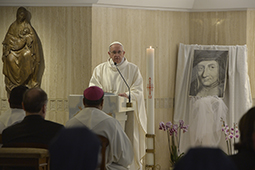
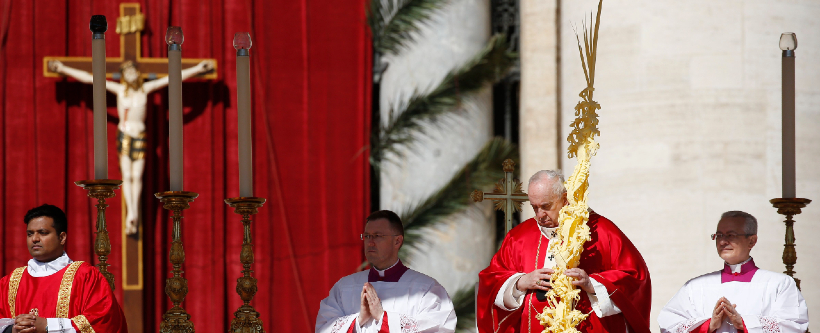
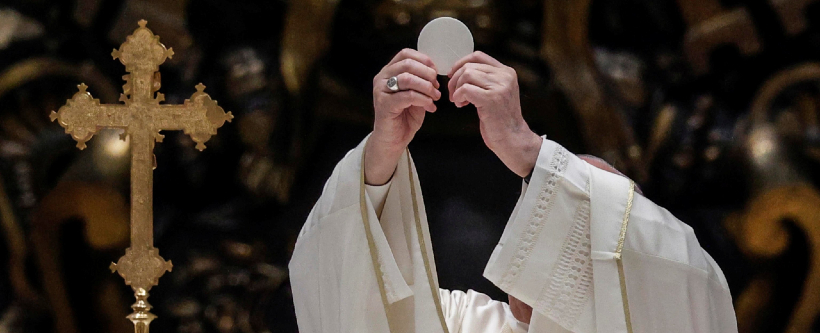
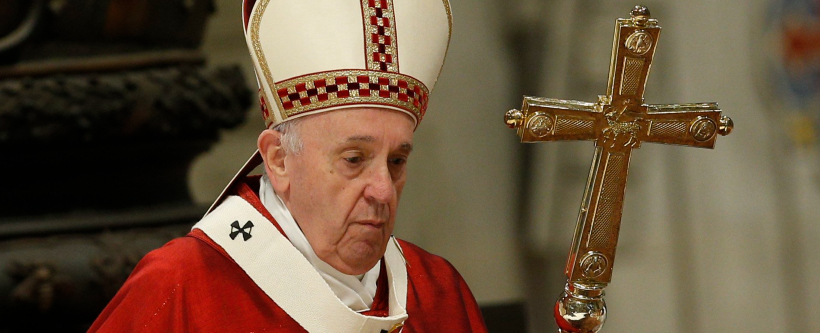
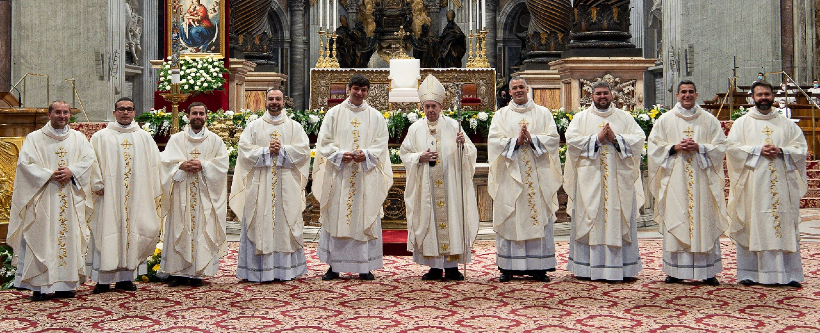
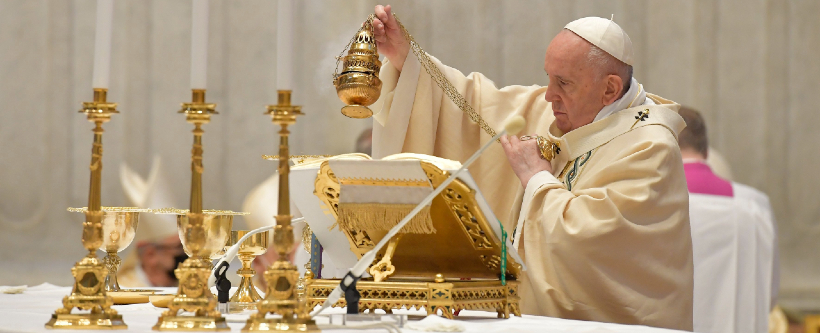
Facebook Comments